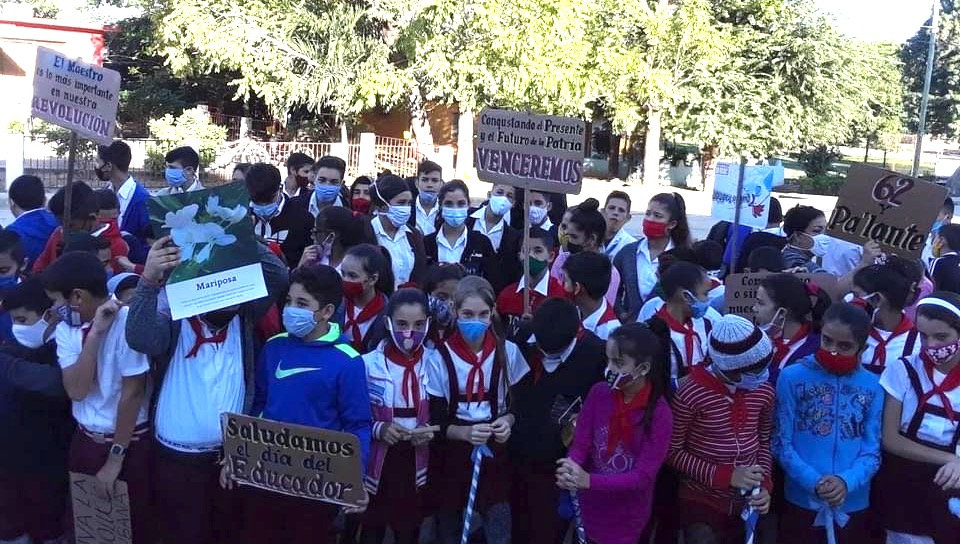The use of minors for the purpose of supporting the slanderous media campaign against the San Isidro Movement has been criticized by relatives whose children are in primary, secondary and pre-university education in Havana.
Although it is not a new practice by control mechanisms of the Cuban regime, mothers, fathers and grandparents consulted agreed that "they are terrorizing our children with information that they can barely understand."
"Manipulating children in that way is the real crime. Schools are centers for teaching and education, not for recruitment," objected Beatriz Medina Oropesa, a resident of Cerro and mother of a minor in the sixth grade.
"The issue is not whether the claims about the young people of San Isidro are true or distorted. The point is that no child should be manipulated the way they are in all the schools and levels of education. One does not have to be a counter-revolutionary or revolutionary to understand that this represents a betrayal of the family's trust: we send our children to learn, not to be indoctrinated or terrorized," Medina Oropesa said.
Although citizens' concerns centered mostly on criticizing the fact that primary and secondary school children are being used to further government propaganda and slander against the San Isidro Movement, other Havana families agreed that it is not their levels of education that matters, but rather the age of the children.
According to the Convention on the Rights of the Child, a child is defined as "every human being below the age of 18, unless, under law applicable to children, they are considered adults earlier."
"The use of minors for manipulation and media propaganda represents a blatant violation of the rights of the child, as established by the international norms that the member states of the United Nations established at the time," noted Delia Domenech Ramos, a librarian and resident of the municipality of Playa.
"But no Cuban can sue or complain to the Ministry of Education without that very act putting them in a position of vulnerability for opposing these mercenary and even terrorist actions, and, therefore, being retaliated against. I believe that these are the questions to discuss, because not only are they sowing terror in our children, but they are also trampling on the rights of parents to question what kind of education children receive in schools," emphasized Domenech Ramos, a grandmother of two children aged eight and 12.
In a statement circulated by the San Isidro Movement, its members pointed out that, as part of the smear campaign, "we have learned that children in schools are being told that those of us with the San Isidro are criminals and mercenaries. "
José Ernesto Castellanos and Marilyn Cabello, residents of the Romerillo district and parents of an 11-year-old sixth-grader, said their daughter told them she had been "scolded" when she asked her History teacher why they were called mercenaries "if they weren't soldiers in military uniforms."
"We’re no longer talking only about using our children for propaganda, of abusing the natural innocence of every child, but their opinions can also be grounds for being lectured in front of their classmates, with the consequences that this entails," said Cabello.
"The worst thing is that many families believe that using our children as mouthpieces is all right. We had a big argument with other parents who claimed that we were exaggerating, they couldn't even see why scolding our daughter was hurting her at all," added Castellanos, who decided to open a Facebook profile to join the protests against children being used to advance the regime’s political propaganda.
As the San Isidro Movement's statement also pointed out, these schoolchildren "…are not taught to think for themselves and to act in accordance with their own ideas," a violation that breaches Article 13.1 of the Convention on the Rights of the Child, which states that "The child shall have the right to freedom of expression; this right shall include freedom to seek, receive and impart information and ideas of all kinds, regardless of frontiers, either orally, in writing or in print, in the form of art, or through any other media of the child's choice."
A mother of a 10-year-old girl, identified as Made, said her fear of protesting or publicizing her rejection goes back to the retaliation she suffered from the principal at her daughter's school for complaining about her daughter's participation in acts condemning members of the Clandestinos group, who spilled blood on several busts of José Martí in Havana.
"My fear is not retaliation against me, but against my daughter. The warning I received from the school administration was strong, intimidating, with veiled threats included. I taught my daughter not to believe anything her teachers say at school, or to make any comments outside the home," said Made.
The father of the minor, identified as Erick, added that "if that was because of the blood on the Martí' busts, imagine what it’s like with this much more serious case, which led to a major militarization of the streets."
"We adults know that all the information is manipulated, like never before, because the accusations against the San Isidro strikers are very serious and a child in Cuba has no way to critically process the 'reality' that they instill in him in the schools. We realize that to remain silent in the face of this is cowardice, but we also know that it is the children who are in the middle, and are quite scared of reprisals against them, even though we know that they are violating their rights," explained Erick.
Article 17 of the Convention on the Rights of the Child reads: "States Parties recognize the important function performed by the mass media and shall ensure that the child has access to information and material from a diversity of national and international sources, especially those aimed at the promotion of his or her social, spiritual and moral well-being and physical and mental health."
